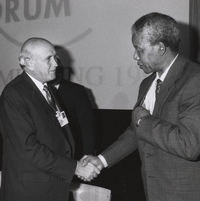In 1980, the controversial U.S. diplomat for Africa, Chester Crocker, memorably described South Africa as a "magnet for one-dimensional minds." The accuracy of that assertion has been confirmed over the course of the post-1994 democratic era, during which mood swings among both the commentariat and the wider populace have caused South Africa to be viewed from several, radically contrasting, but ultimately one-dimensional perspectives.
Between 1994 and 1999, under the presidency of Nelson Mandela, South Africa was routinely described as a "miracle," a country that had somehow managed to navigate the treacherous waters of the transition from apartheid, while putting in place the foundations for a successful multiracial democracy. Because of this, South Africa was hailed as a model for the resolution of conflicts in other societies deeply divided along racial, ethnic or religious fault lines.
By the turn of the century, however, the idea of South Africa as a "universal metaphor," as Mark Gevisser phrased it, had been replaced by a growing sense of disillusionment. The mystique surrounding the new South Africa had begun to fade as the country entered a more recognizable political era -- one of shabby compromises, thwarted ambition and more fallible leadership. In this less inspirational environment, South Africa gradually became "just another country."

